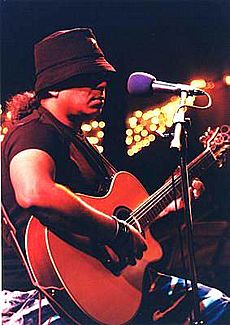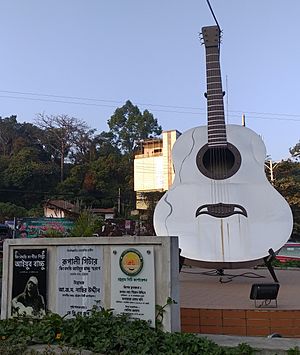Ayub Bachchu facts for kids
Quick facts for kids
Ayub Bachchu
|
|
|---|---|
| আইয়ুব বাচ্চু | |
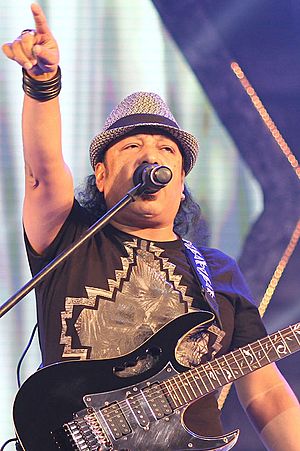
Bachchu performing at the Emami Fair and Handsome Award, Bangabandhu International Conference Centre, Dhaka, October 2014.
|
|
| Born | 16 August 1962 Patiya, Chittagong, Bangladesh
|
| Died | 18 October 2018 (aged 56) |
| Resting place | Buried in Chaitanya Goli, Chittagong, Bangladesh |
| Education | Govt. Muslim High School, Chittagong |
| Occupation |
|
| Spouse(s) |
Ferdous Akhtar Chondona
(m. 1991) |
| Children | Fairuj Saffra Ayub (daughter) and Ahnaf Tazwar Ayub (son) |
| Musical career | |
| Genres | Rock |
| Instruments |
|
| Years active | 1977–2018 |
| Labels |
|
| Associated acts | |
| Signature | |
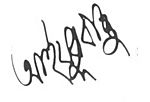 |
|
Ayub Bachchu (born August 16, 1962 – died October 18, 2018) was a famous Bangladeshi rock musician. He was a talented guitarist, composer, singer, and songwriter. He founded the popular Bangladeshi rock band LRB. He was the lead singer and lead guitarist for LRB, achieving great success.
Many people consider him one of the best singers in Bangladesh's history. He also helped shape Bangladeshi pop music. Bachchu was born in Patiya and moved to Chittagong in the early 1970s. He started his first band, "Ugly Boys," in 1977. Later that year, he joined the rock band Feelings as a guitarist.
In 1980, he joined the band Souls. He played with them for ten years and was part of four studio albums. In 1991, he left Souls to create his own band, LRB. He was the vocalist and guitarist for LRB for 27 years until he passed away.
With LRB, he released the first ever double album in Bangladesh in 1992. This was called LRB I and LRB II. LRB's third album, Shukh, featured "Cholo Bodle Jai". This song is one of the most famous rock songs in Bangladesh. Bachchu also had a very successful solo career. His first solo album, Rokto Golap, came out in 1986. Albums like Moyna (1988) and Koshto (1995) made him even more famous.
He released the first ever instrumental album in Bangladesh, Sound of Silence, in 2007. Ayub Bachchu's first song, "Harano Bikeler Golpo," was written by Shahid Mahmud Jangi. LRB's first song, "Ghum Bhanga Shohore," was also written by Jangi.
Bachchu released many best-selling albums with LRB and as a solo artist. He won six Meril Prothom Alo Awards. He also won a Citycell-Channel I Music Award with LRB. In 2004, he won the Bachsas Awards for Best Male Vocal. He received the Tele Cine Lifetime Achievement Award in 2017.
In October 2018, Bachchu passed away from heart failure at his home in Dhaka. He had been dealing with a lung problem for six years. He performed his last concert in Rangpur City just two days before he died. He was buried in Chittagong, next to his mother's grave.
Contents
Early Life and Musical Beginnings
Ayub Bachchu was born on August 16, 1962, in Patiya, Chittagong. His parents were Mohammad Ishaque Chowdhury and Nurjahan Begum. His family moved to Chittagong city after the Bangladesh Liberation War. He was the oldest of three brothers. His nickname was Robin.
In 1973, when he was in fourth grade, his father gave him his first acoustic guitar. He learned to play guitar from Jacob Dias, who founded the "Spider" band. Bachchu played guitar with the "Spider" band from 1974 to 1977. After that, he started his own band called "Ugly Boyz."
He borrowed an electric guitar from his friend, Kumar Bishwajit. Bachchu was very interested in the guitar styles of Jimi Hendrix and Joe Satriani. He finished high school in 1979. At first, his parents did not want him to be a musician. But they saw his strong passion for rock music and eventually supported him.
While in high school, Bachchu formed a band called "Golden Boys." This band was later renamed "Ugly Boys." Kumar Bishwajit was the lead singer, and Bachchu played guitar. They performed at clubs and weddings. The group broke up when Bachchu joined Souls in 1980.
Music Career
Joining Feelings and Souls (1977–1990)
While working with his band Ugly Boys, Bachchu joined the rock band Feelings in 1977. The band's leader, James, saw Bachchu playing guitar at a tea stall. He was so impressed that he asked Bachchu to join Feelings. Bachchu joined as the lead guitarist in mid-1977. He stayed with the band for two years.
In 1980, he joined the band Souls. Souls' keyboardist, Naquib Khan, saw Bachchu play and was amazed. He and the lead singer, Tapan Chowdhury, asked Bachchu to join their band. Bachchu joined Souls in early 1980. He played with them for 10 years as the lead guitarist, songwriter, and sometimes a singer.
He was part of four Souls albums: Super Souls (1982), College Er Corridore (1985), Manush Matir Kachakachi (1987), and East and West (1988). "Harano Bikeler Golpo" was his first song sung with Souls. In late 1990, Bachchu left Souls to form his own band, Little River Band. This band later became famous as Love Runs Blind (LRB). He sometimes reunited with Souls members for special shows.
Forming LRB (1991–2018)
After leaving Souls in late 1990, Bachchu moved to Dhaka. In January 1991, he married Ferdous Chandana. He had been in a relationship with her since 1986. On April 5, 1991, he formed a new band called Yellow River Band. The band members were Saidul Hasan Swapan (bass), S.I. Tutul (keyboards), and Habib Anwar Joy (drums).
During a performance in mid-1991, they were mistakenly called the Little River Band. Bachchu liked the name and officially adopted it for his band. However, they later learned about an Australian rock band with the same name. So, in 1997, they changed their name to Love Runs Blind (LRB).
In April 1991, LRB performed their first concert at the University of Dhaka. This concert celebrated the end of autocratic rule in Bangladesh. In January 1992, LRB released the first ever double album in Bangladesh: LRB I and LRB II. The band's third album, Shukh, came out in June 1993. It included the hit song "Cholo Bodle Jai", which many consider Bachchu's best work.
LRB released many albums in the 1990s and quickly became one of Bangladesh's most popular rock bands. In 1996, they performed in Bengaluru, their first concert outside Bangladesh. LRB is also the only Bangladeshi artist to perform at Madison Square Garden in New York City.
After Bachchu's death, the remaining LRB members announced Balam Jahangir as their new lead singer. Bachchu's wife and daughter were not happy with the band using the LRB name with a new singer. They asked the members to change the name. The band temporarily disbanded, and the members formed "Balam and the Legacy." However, after discussions, Bachchu's son, wife, and daughter agreed to let the band continue using the LRB name.
Solo Career Highlights
Early Solo Albums (1986–1988)
While still with Souls, Bachchu recorded and released two solo albums: Rokto Golap and Moyna. These albums mostly featured pop rock songs. Some songs also blended with classical music and used instruments like the tabla.
Rokto Golap, released in September 1986, was his first solo album. It included pop rock, classical, and modern Bangla songs. It also had "Anamika," his first hard rock song. Moyna helped him gain more fame. It featured pop rock and hard rock songs and sold about 60,000 copies in Bangladesh.
Koshto (1995)
After forming LRB in 1991, Bachchu did not release a solo album for seven years. In 1995, after LRB's album Ghumonto Shohore, he recorded Koshto. This album was released in October 1995. Many consider Koshto to be his best solo work. It featured popular songs like "Koshto Pete Valobashi" and "Koshto Kake Bole."
The album was produced by Bachchu himself. It was very popular with fans. By 1996, Koshto had sold over 300,000 copies, making it one of Bangladesh's best-selling albums.
Shomoy and Eka (1998–1999)
Even though Bachchu loved powerful rock music, his solo career often featured pop rock and soft rock songs. He always had a special interest in blues, jazz, and funk music. This love for these styles was clear in LRB's music.
In early 1998, Bachchu started his own studio, AB Kitchen. He wanted to release double albums as a solo artist, just like he did with LRB. He recorded his fourth album, Shomoy, and fifth album, Eka, in his new studio. Both albums were released in early 1999. However, they were not as popular as his previous solo album, Koshto.
Other Musical Contributions
Bachchu performed live with many famous artists from India and Bangladesh. He was also a judge on music competitions like "IIM Joka Rock Fest" in India and "D-Rockstar I." He served as a judge on Bangladeshi Idol.
He worked as a music director for many other singers. Bachchu was also known for creating music for TV commercials. He wrote songs for Grameenphone and arranged music for the "Dol Lage Dol" song for the 2014 FIFA World Cup. Bachchu also worked with Radio Foorti to help new musical talents. He was a leader in the Bangladesh Musical Bands Association (BAMBA).
Personal Life
Family Life
Ayub Bachchu met Ferdous Akhtar Chondona in early 1986. He said he fell in love when he saw her picture. Chondona's family initially did not want her to meet him. Bachchu said that the LRB song "Ferari Mon" from their first album tells the story of how he wanted to meet Chondona.
He struggled financially when he first moved to Dhaka. After leaving Souls in late 1990, he returned to Dhaka and proposed to Chondona. Both families eventually agreed, and they married on January 31, 1991. They had two children: a daughter, Fairuz Saffra Ayub (born 1994), and a son, Ahnaf Tazwar Ayub (born 1996).
AB Kitchen Studio
AB Kitchen is a music recording studio and production company. Ayub Bachchu founded it in 1998. Over 40 studio albums, many TV commercials, and film scores have been recorded there. The first album produced by AB Kitchen was Bachchu's solo album Shomoy in 1999. Since 2001, all LRB albums have been recorded and released by this studio. AB Kitchen also started projects like D-Rockstars (2005) and R-Music (2006) to find new talent.
Musical Style and Influences
Guitar Playing Style
Bachchu often said that Jimi Hendrix was the biggest influence on his guitar playing. He also looked up to guitarists like Steve Vai and Joe Satriani. After S.I. Tutul left LRB in 2003, Bachchu did not add another keyboardist. Instead, he brought in Abdullah al Masud as a rhythm guitarist.
Bachchu became interested in guitarists like John Petrucci and Jason Becker. Because of this, LRB's music became heavier, and the band started releasing heavy metal songs.
At the time of his death, Bachchu owned 65 guitars. He often played Ibanez guitars and Carvin guitars. He also owned special signature guitars from his favorite musicians. In July 2017, he sold five of his guitars to young players. He wanted to start a guitar competition with them. On stage, he used a Marshall JCM2000 amplifier.
Singing and Songwriting Influences
Bachchu's singing style was sometimes compared to modern Bangla musicians. Being a bandmate with Tapan Chowdhury in Souls influenced him. Indian musician Prabuddha Banerjee noted that Bachchu's voice was very romantic.
His high-pitched singing in LRB songs like "Gotokal Raate" and "Khoniker Jonno" was similar to Ian Gillan of Deep Purple. He was also a big fan of Azam Khan. Khan inspired Bachchu to write and sing rock songs in Bengali.
Bachchu's song lyrics were inspired by bands like the Eagles, Deep Purple, Pink Floyd, and the Jimi Hendrix Experience. He often mentioned "Witchy Woman" and "Hotel California" by the Eagles as his favorite lyrics. The Beatles and Iron Maiden also influenced his songwriting.
Passing Away
In 2009, Bachchu had successful heart valve surgery. He became a regular patient at Square Hospital. On October 18, 2018, he passed away from heart failure at his home in Dhaka. He was 56 years old. Doctors confirmed his death upon arrival at the hospital.
He had performed his last concert in Rangpur two days before his death. His body was placed at the Central Shaheed Minar for four hours. Here, his fellow musicians and fans paid their last respects. His first funeral prayer was held in Dhaka. His body was then taken to Chittagong and buried in the Chaitanya Goli graveyard, next to his mother's grave.
Tribute Concerts
After Bachchu's death, rock and metal artists in Bangladesh held a tribute concert. This concert took place on December 2, 2018, arranged by BAMBA. Many artists performed his famous songs.
Artists from both West Bengal (India) and Bangladesh also held a tribute concert in Kolkata on December 24. It was called "In the Memorium of Ayub Bachchu, the Rocking of two Bangla." Bachchu's guitar teacher, Jacob Dayas, was also there.
Ten Bangladeshi bands from Canada held a tribute concert in Toronto on December 15, 2018.
Legacy and Impact
Ayub Bachchu is highly respected in the music world. He ranked second on The Top Tens list of "Top 10 Greatest Guitarist of Bangladesh." Ibrahim Ahmed Kamal, who was ranked first, said that Bachchu deserved the top spot.
He is credited with making rock music popular in Bangladesh in the 1990s. He did this as the leader of LRB and as a solo artist. He is considered one of the "big three rockstars of Bangladesh," along with Azam Khan and James. He was also the first electric guitarist in Bangladesh to use distortion in songs. He once said that he was forced to leave Souls because he wanted to play distorted guitar.
Many guitarists were influenced by him, including Ibrahim Ahmed Kamal, Iqbal Asif Jewel, and Ershad Zaman.
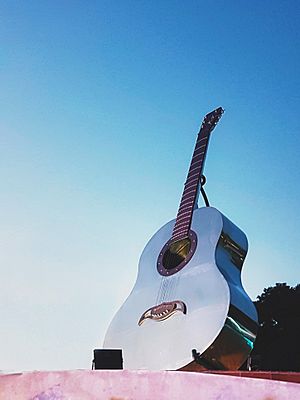
Former Minister of Cultural Affairs, Asaduzzaman Noor, said that Bachchu's death affected many people. This showed how great he was as an artist. Hamin Ahmed of Miles said that Bachchu made the guitar a central instrument in Bangladeshi music. Bappa Mazumder of Dalchhut said that Bachchu taught them about music and how to be a good person. Indian singer-songwriter Sahana Bajpaie remembered him as a pioneer of Bengali rock music.
On December 19, 2018, Asif Akbar released a song called "A Tribute to the Great Legend Ayub Bachchu." On October 20, 2018, the mayor of Chittagong City Corporation suggested naming an important road and a hall after him. A sculpture of an 18-feet tall guitar made of steel was unveiled in Chattogram in his honor.
Achievements
Tele Cine Awards
| Year | Nominee / work | Award | Result |
|---|---|---|---|
| 2017 | Ayub Bachchu | Lifetime Achievement Award | Won |
Bachsas Awards
| Year | Nominee / work | Award | Result |
|---|---|---|---|
| 2004 | Ayub Bachchu | Best Male Vocal | Won |
Meril Prothom Alo Awards
| Year | Nominee / work | Award | Result |
|---|---|---|---|
| 1998 | Love Runs Blind | Best Band of the Year | Won |
| 1999 | Love Runs Blind | Best Band of the Year | Won |
| 2000 | Love Runs Blind | Best Band of the Year | Won |
| 2001 | Mon Chaile Mon Pabe | Album of the Year | Won |
| 2005 | Love Runs Blind | Best Band of the Year | Won |
| 2007 | Sporsho | Album of the Year | Won |
| 2009 | "Bolini Tomai" | Best Male Vocal of the Year | Nominated |
Citycell-Channel I Music Awards
| Year | Nominee / work | Award | Result |
|---|---|---|---|
| 2007 | Sporsho | Album of the Year | Won |
Discography
Solo Albums
- Rokto Golap (1986)
- Moyna (1989)
- Koshto (1995)
- Shomoy (1999)
- Eka (1999)
- Prem Tumi Ki (2000)
- Duti Mon (2002)
- Kafela (2002)
- Prem Premer Moto (2003)
- Pother Gaan (2004)
- Vatir Gaane Matir Tane (2006)
- Jibon (2006)
- Sound of Silence (2007)
- Rim Jhim Brishti (2008)
- Bolini Kokhono (2009)
- Jiboner Golpo (2015)
Albums with Souls
- Super Souls (1982)
- College Er Corridore (1985)
- Manush Matir Kachakachi (1987)
- East and West (1988)
Film Music
Ayub Bachchu also created original music for these films:
- Luttoraj (1996)
- Sagorika (1998)
- Lal Badshah (1999)
- Ammajan (1999)
- Gunda Number 1 (2000)
- Bachelor (2004)
- Wrong Number (2004)
- Chander Moto Bou (2009)
- Chorabali (2012)
- Television (2012)
- Ek Cup Cha (2014)
See also
- Love Runs Blind
- চলো বদলে যাই (Let's Change)
 | Tommie Smith |
 | Simone Manuel |
 | Shani Davis |
 | Simone Biles |
 | Alice Coachman |


